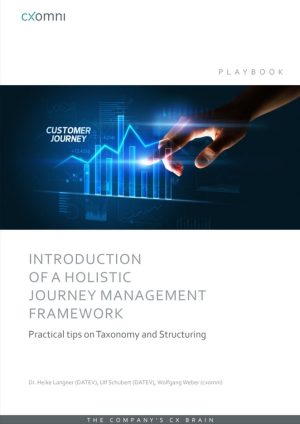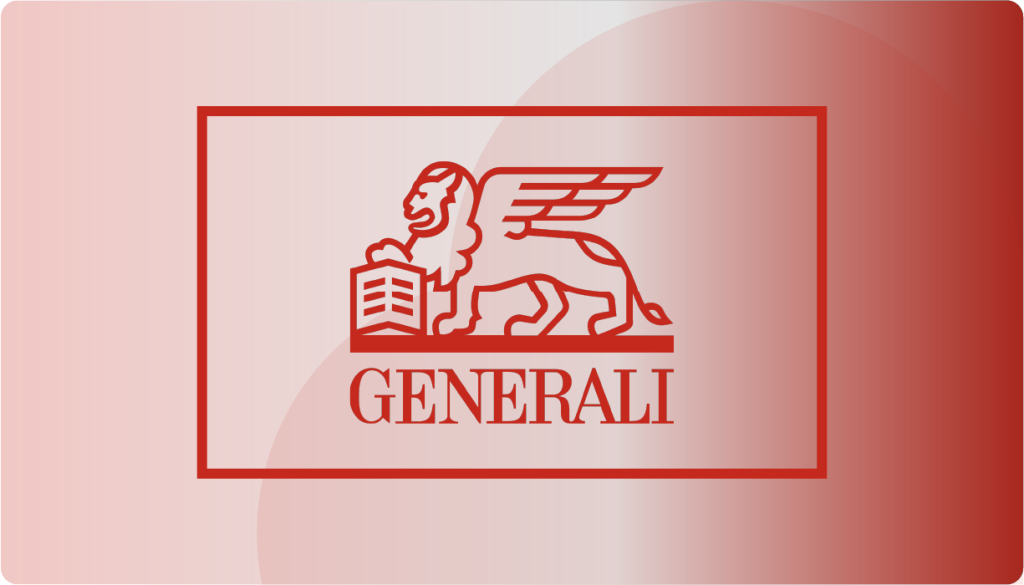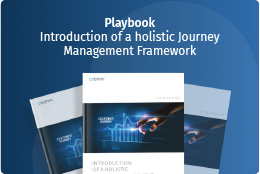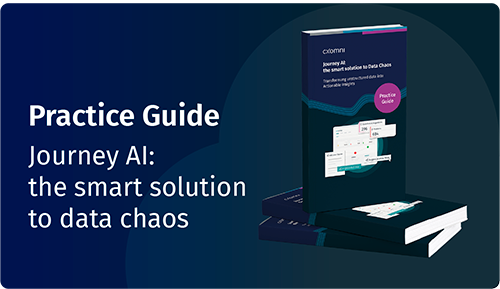CUSTOMER JOURNEY MANAGEMENT
Holistic Customer Journey Management: Inspire customers for life!
With Customer Journey Management, companies adopt the customer perspective, consistently evaluate processes from the perspective of their target group and trigger improvement measures. Because with a Journey Management software, you not only visualise customer journeys, but also connect them with CX data and gain insights into the customer’s pains and needs. These insights can be automatically orchestrated as requirements for stakeholders. Customer Journey Management thus ensures continuous CX optimisation and supports business success through better customer retention, higher conversion rates and product innovations.
Proactively control and manage customer experience
What is Customer Journey Management?
Customer Journey Management is the process of planning, designing, managing, and optimizing a customer’s entire journey. This happens before, during, and after the customer interacts with a company’s products and services. It includes all interactions and touch points across the entire customer lifecycle: from awareness of a need, to interest, to purchase, to post-sale.
The goal of Customer Journey Management is to continuously improve the customer experience and the product throughout all phases. Key factors are customer satisfaction, customer loyalty, and conversion rates. With Customer Journey Management, these can be continuously optimized to increase the company’s business success.
Benefits of holistic customer journey management
- Customer Experience optimization through early identification of pain points
- Omnichannel consistency by ensuring the same CX across all touchpoints.
- Innovation potential for products and services that offer customers and companies added value
- Measurable KPIs for monitoring the success of customer acquisition and retention measures
- Long-term customer relationships through positive interactions along the customer journey
- Monitoring touchpoint relevance for greater cost efficiency
Components of Holistic Customer Journey Management
With Customer Journey Mapping, companies first visualize Customer Journeys for Customer Journey Management.
Taxonomies and terminologies help to structure Journey Management projects and define how to cluster information.
Software is used to aggregate CX data to maps or moments-that-matter, process it, and orchestrate it as Actionable Insights.
Data integrations from web analytics, customer feedback or CRM turn journey maps into a management tool.
CX and UX teams work collaboratively with the software, creating transparency and highlighting potential for journey improvements.
Understanding Journeys and using insights
From Customer Journey Mapping to Customer Journey Management
Customer Journey Mapping refers to the visualization and analysis of the stages and touchpoints of a journey and their impact on the overall customer experience. It is a well-established method for better understanding customer behavior, including needs, pains, expectations, and emotions (outside-in perspective).
With Customer Journey Management software, companies can control all the workflows and strategies for designing, implementing, and optimizing the omnichannel customer experience and customize it for each target audience.
By enriching journeys with CX data, the software allows conclusions about the current preferences of the target group or the most effective channels and touchpoints (Customer Journey Analytics).
All this information can be distributed throughout the organization as actionable insights via the tool’s journey orchestration feature and used for CX optimization.
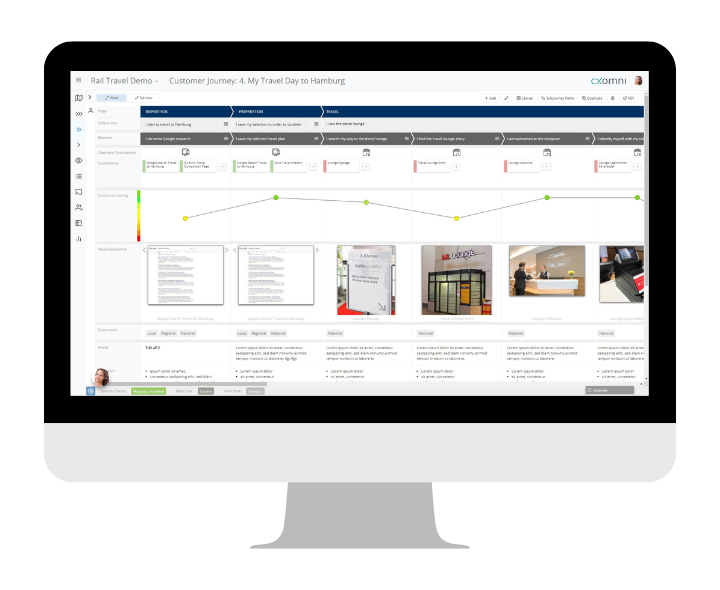
Transparency and standards for CX projects
The benefits of a Customer Journey Management Framework
A framework allows distributed organizations to create a consistent information standard and a “common” language for their Journey Management projects. Therefore, these three elements are necessary:
- Taxonomy: It organizes information so that it can be distributed and used throughout the organization. In this way, each stakeholder knows how specific information fits into the overall context..
- Terminology: This defines all technical terms used in the Journey Management Framework so that all project participants develop the same understanding of journeys and use the same wordings.
- Information architecture: This is the concept for the aggregation and distribution of data and insights within the organization. Data sources, insight types and information presentation formats are defined in a binding manner.

Wondering how to properly implement Customer Journey Management?
Our webcast with guest speaker Joana de Quintanilha from Forrester provides you with answers. Learn why customer-centric organizations should implement Journey Management and find out how your organization can benefit from our use cases.

Data-driven Journey Management Software
How Journey Management Systems Work
Unlike whiteboarding tools for Journey Mapping, Journey Management systems have more comprehensive capabilities due to their database structure. All personas, touchpoints and insights are available as database elements. In addition, research data, open comments, as well as CRM and Web analytics information can be linked to touchpoints and sub-journeys for analysis.
With these dynamic journey maps, organizations can see how customers actually experience their journeys and what their touchpoint needs and desires are. These insights can then be distributed to departments in real time as pain points, suggestions for improvement, system requirements, etc. (Journey Orchestration).
This allows process and product optimization to be initiated promptly and customer journeys to be managed sustainably.
Benefits of a holistic Journey Management System
- Scaling and standardization of journey mapping
- General access and promotion of cooperation with stakeholders
- Analysis dashboards for e.g. touchpoint performance, reporting etc.
- Coordinating how business functions and roles influence customer experience
- Linking Actionable Insights and requirements management (e.g. Jira)
- Transparency and status of insights optimization
Daten-Integration und APIs
Data continuously brings fresh insights to the journey map
Data integration turns journey maps into a sustainable customer experience management tool. Without data, maps quickly become a flash in the pan. Key data sources for holistic Customer Journey Management include web analytics, community surveys, qualitative and quantitative user research, open text sources, and CRM or service center systems. They provide audience-specific insights into customer behavior and satisfaction.
The customer journey sets the framework: This means, data is mapped according to the logic of the respective journeys and their Moments-that-matter. This makes it easy to filter between data insights, journey maps, and detailed touchpoint information. With this approach, companies get measurement points that CX teams can use to continuously validate journey mapping assumptions.
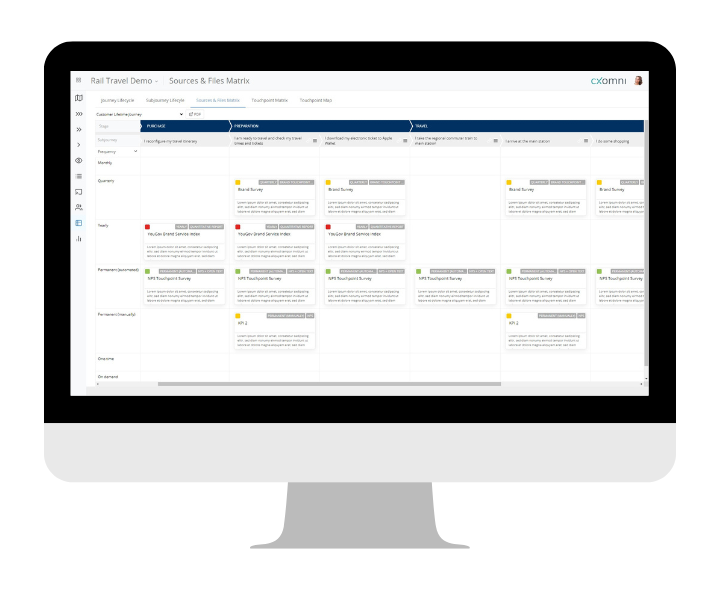
Internal bridge builders
Tasks of the Customer Journey Management Team
Customer Journey Management teams are the link between business departments and Journey Management. Using methods such as classic journey mapping or journey metrics such as NPS and CSAT, they ensure a consistent methodical approach across the teams involved. Therefore, they visualize journeys and measure the customer experience at touchpoints. They bring together people from different departments to work together on the wins and losses of individual journeys or products.
Ideally, Journey Management teams are interdisciplinary and cross-functional. This enables them to quickly gain the necessary domain and process knowledge, so that they can work closely with the stakeholders they need to act on Actionable Insights.

Further News & Insights on Customer Journey Management
Customer Journey Management Playbook
Manage the first steps of your Customer Journey Management with our playbook. In over 42 pages, you’ll find valuable best practices for implementing the right management tools and effectively leveraging insights from your organization’s journeys.
Learn, among other things:
- What is important when selecting the right software
- What are the right steps during implementation
- Which parties and stakeholders should be involved in the process
